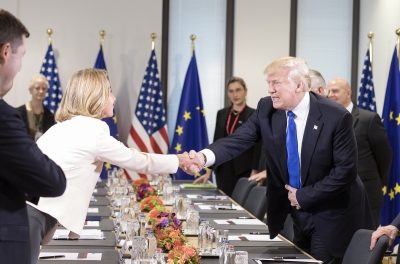
Brussels, Feb 20 (IANS) The EU trade chief is on a business trip in Washington to talk with his US counterpart in hopes of averting a tariff war with the United States.
Given that the US fresh tariff measures, if unanswered, will take its toll on the flailing EU economy, the trip of Maros Sefcovic, the European Commission’s Commissioner for Trade and Economic Security, is part of the bloc’s latest efforts to deescalate the trade tension, which is mainly centered on the EU’s trade deficit with the United States.
The US administration announced on February 10 that it would impose a 25-per cent tariff on steel and aluminum imports and proposed “reciprocal” trade policies, which was met with a swift backlash from the EU.
“The European Commission views President (Donald) Trump’s proposed ‘reciprocal’ trade policy as a step in the wrong direction,” the commission said in a statement.
The US moves put the EU on high alert as they will inevitably pile pressure on the exports, the manufacturing industry and the economy of the bloc.
The EU could lose up to 3.7 million tonnes of steel exports to the United States, the second biggest export market for EU steel producers, warned the European Steel Association in a statement
A lot of the steel plants in the EU, which have already been struggling under the burdens of rising costs and weaker demand, will be forced out of business, according to the association, Xinhua news agency reported.
Bert Colijn, an economist at ING, believes that additional tariffs would “lead to a prolonged downturn in European industry.”
The proposed “reciprocal tariff” policy will also deal a heavy blow to the struggling EU auto industry, especially Germany. The “reciprocal tariff” issue has been contended by industry insiders who argue that the tariffs are more complicated than they appear to be.
Hildegard Mueller, President of the German Association of the Automotive Industry, noted that the United States, which criticizes the EU’s 10 per cent tariff on imported passenger cars, imposes a 25 per cent tariff on imported pick-up trucks, which are among its best-selling vehicles.
Once hailed as the “engine of the European economy,” the German output has shrunk for two consecutive years, making it one of the worst performers among EU member states. The German government revised its 2025 growth forecast from 1.1 per cent to 0.3 per cent in January. The new US tariffs will compound the plight of the German economy as German exports of steel and auto products to America are set to decline.
The US tariffs also weigh on France, whose economy contracted in the last quarter of 2024. French companies in the automotive, pharmaceutical and wine industries fear that US tariff measures could reduce their exports to the US market. The French government is currently grappling with high public debt and fiscal deficits.
The US trade policy is also on the radar of the European Central Bank (ECB), which is scaling back its restrictive monetary policies by cutting interest rates. In case of a trade war, resurging prices can delay or even derail the rate-cutting cycle of the ECB. ECB President Christine Lagarde previously warned that the US government’s planned tariffs “would have a negative impact globally.”
Trade ministers from the EU’s 27 member states reached consensus at a video conference last week in the wake of the US announcement of new tariffs.
Negotiations, as the EU trade ministers believe, will be the best option for the EU to avert a tariff war.
The EU remains committed to constructive dialogue and is ready to negotiate to find solutions where possible, Sefcovic said. At the Munich Security Conference, he voiced the EU’s willingness to discuss trade deficits, automobiles, soybeans, liquefied natural gas (LNG), and other issues that can be resolved at the negotiating table.
In an apparent bid to address the US concern of the trade deficit with the EU, the European Commission President Ursula von der Leyen has previously proposed expanding LNG imports from the United States as a viable trade strategy. The EU is also considering importing more agricultural products and military equipment from the United States and reducing its tariff on US cars from the current 10 per cent to 2.5 per cent.
Since tariffs have been long known as the hallmark of the Trump administration, the EU has already acted preemptively to mitigate the looming threat of new US tariffs. Despite opposition from some member states, the EU reached a free trade agreement with the South American trade bloc MERCOSUR to hedge against the uncertainty of US trade policies and diversify trade relations. The EU and Canada also agreed to strengthen trade and investment ties this month.
Meanwhile, countermeasures are also in the pipeline as von der Leyen vowed that the EU would act to safeguard its economic interests and the US tariffs “will not go unanswered.”
The EU chief has vowed that the “unjustified” tariffs will trigger “firm and proportionate countermeasures” from the EU.
According to sources with the European Commission and the European Parliament, the EU has already penciled in a list of retaliatory measures.
Bernd Lange, Chair of the European Parliament’s International Trade Committee, warned that the EU could immediately retaliate against the US double tariff rates. Products such as motorcycles, jeans, peanut butter, whiskey, and other items that impact US exporters could be targetted, with special attention given to products from US states with strong Republican support and traditionally strong US exports.
Some European Commission officials revealed that the EU will look into the possibility of putting in place stricter import restrictions, including limiting imports of agricultural products like soybeans which are grown using EU-banned pesticides, in response to the US “reciprocal tariffs.”
Also inside the EU’s toolbox is the EU’s Anti-Coercion Instrument, which came into effect at the end of 2023. Under the act, the EU is entitled to take retaliatory measures against third countries that attempt to economically coerce EU member states into changing policies. A broader range of countermeasures have been made available, allowing the EU not only to impose tariffs on goods but also to restrict third-country companies from participating in public procurement projects or to limit services trade and investment.
While the United States goes into trade deficit with the EU in goods, it has a surplus in services trade. The EU has been an important market for many US tech giants, such as Amazon and Microsoft. The EU could weaken intellectual property protections for US companies in the EU market and use regulatory measures to restrict the operations of American tech companies in Europe.
Under the Digital Markets Act and the Digital Services Act, the EU has already launched investigations into Apple, Alphabet, X (formerly Twitter) and Meta. In addition, the EU may revive the “digital services tax,” imposing levies on digital services such as online advertising and data sales provided by American tech companies.
–IANS
int/as




